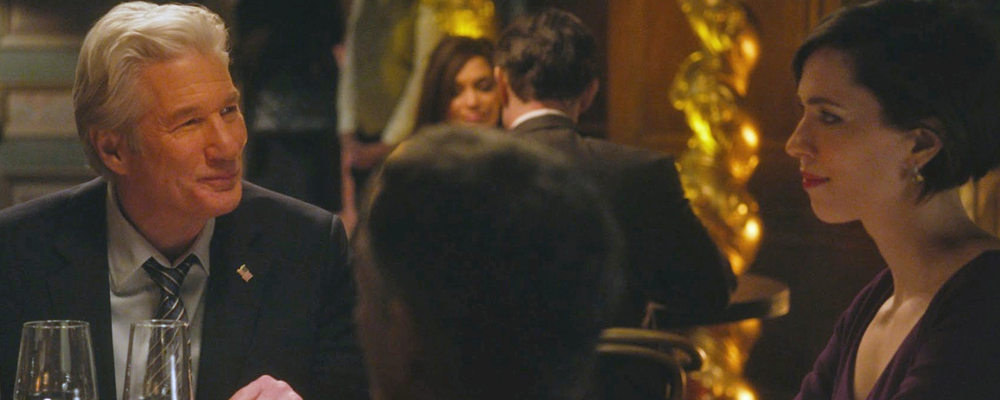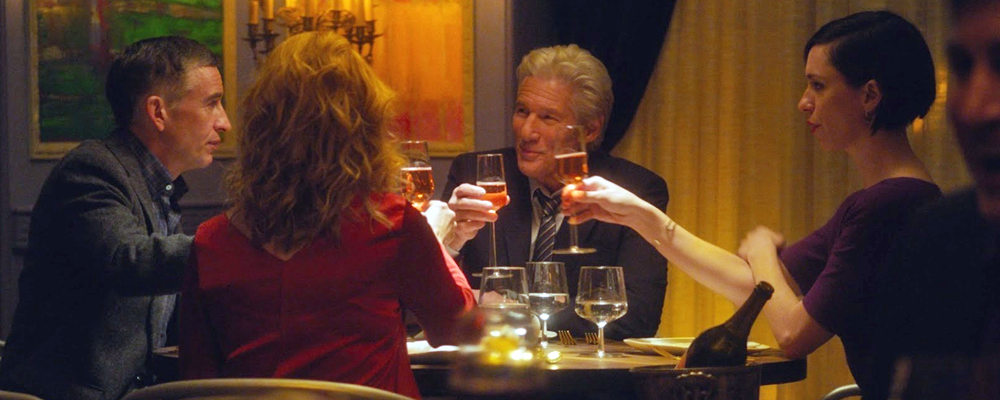Director Oren Moverman Discusses ‘The Dinner’ and Living in a Post-Humanist World
Sandra Miska
In the thriller ‘The Dinner,” two brothers – former history teacher Paul Lohman (Steve Coogan) and Congressman Stan Lohman (Richard Gere) – try to put their differences aside one fateful evening and break bread along with their respective wives, Claire (Laura Linney) and Katelyn (Rebecca Hall). As the evening progresses, it becomes apparent that their reason for getting together is about more than healing old wounds, as Paul and Claire’s son Michael (Charlie Plummer) and Stan’s son Rick (Seamus Davey-Fitzpatrick) have committed an unspeakable crime. Although a video of what went down is on YouTube, the boys have yet to be identified by law enforcement, and it’s now up to the grown-ups in their lives to decide what to do. The stakes are high for Stan, as he is currently running for governor. But they might be even higher for Paul, who is revealed to be battling some major demons.
Writer/director Oren Moverman adapted the screenplay for “The Dinner” from the novel by Dutch author Herman Koch. Moverman recounted to Entertainment Voice how the material was dropped into his lap by a certain Oscar-winning actress. “To be honest, I was actually asked to adapt this book for Cate Blanchett to direct. She was looking into directing and really liked this book—which was a popular worldwide bestseller, and she basically came to me with the book, and when Cate Blanchett is knocking, you answer the door. Obviously, Cate couldn’t [direct], and she handed it off to me. What attracted me mostly was the opportunity to really tackle so many issues in one movie and kind of make it really layered and provocative and kind of a call to action or a call to a conversation… [The book] asks hard, almost impossible questions about parenting.”
Few people would say that Coogan and Gere resemble brothers, and it is the differences between the two that works so well as to add to the tension. “I have to confess that when I write, I really don’t have anyone in mind,” admitted Moverman. “Actually, I’m one of those screenwriters who can’t picture anyone in any role, because I think ultimately what I am interested in after the screenplay is written is to see who’s interesting to interpret a role as opposed to kind of nail it off the page. I think at the end of these days when I’m writing these screenplays, I probably see myself playing every part, and not well.”
Moverman may not write roles with specific performers in mind, but one actor who always seems to find himself pulled into his orbit is Gere, as “The Dinner” the two of them have collaborated in some capacity. What is it that keeps bringing the pair together? “Sex appeal, basically,” Moverman joked. “First and foremost, I just respect him as an actor, as an artist, and as someone who has taken on a certain kind of persona as a movie star but is much more than that persona, and exploring things beyond that persona are really interesting to me because I really believe in him as an artist and as talent. Beyond that, we’ve become friends and collaborators, and he’s someone I really trust. I really trust his way of thinking, and I trust his heart and his path into things I may not really understand… I see him as a collaborator, but also as a teacher…”
As great as Gere is as Stan, a politician with a conscience, it is Paul who is the most intriguing character. He would have everyone believe that his brother is a jerk, but flashbacks exhibit how Stan, sometimes with the support of his first wife (Chloe Sevigny), stood by Paul and tried to help him as he succumbed to mental illness. “I wish I could say Paul is a mystery to me, but he’s not,” admitted Moverman. “I totally understand that kind of intensity and that kind of anger. I think he’s someone who is clearly not well. He has issues with his family, with his extended family, and has kind of gone through a lot of mental anguish and ultimately he’s really angry about the injustices in the world and expresses them in a very uncomfortable way that makes others not want to be around him. I understand that kind of impulse. I think I’m more socially adaptable than that. When I had conversations with Steve Coogan, we did share our understanding of Paul.”
A pivotal moment for Paul and Stan occurs when Paul has a breakdown during a trip to Gettysburg, PA, the site of the historical Civil War battle with which Paul is obsessed. In the original novel, that character travels to Berlin. Why in this American retelling of the story did Moverman choose to have Paul be drawn to this particular historical site? “In adapting this for the United States, I had to think, ‘What’s an interesting place that he could go to as a historian?’ In Berlin, he was really affected by the monuments. There isn’t another place like Gettysburg in the United States in terms of monuments. There are over 3,000 monuments in Gettysburg. It’s the bloodiest place in America. The biggest battle was fought there. 50,000 people were killed. …I added the Gere character to come along for the ride because this is a battleground for brother against brother. Two brothers going to Gettysburg for a place of healing was sort of interesting to me.”
It wouldn’t be truthful to claim that “The Dinner” leaves the viewer feeling as warm and fuzzy as a good meal, nor is it exactly a celebration of the culinary arts. However, the elaborate dishes that are delivered by the eager waiter (Michael Chernus, who also serves up some comic relief) are almost like another character. They help set the mood, as few of the dishes sound particularly appealing for the price being paid—at least to those with an ordinary palette, such as Paul, which only serves to add to the resentment he feels for Stan, the restaurant picker. “That was really the fun part of this,” Moverman said of writing about the food. “Not that the rest of it was all suffering. It’s so silly on a certain level, and I know I shouldn’t say that because real foodies are going to be [annoyed] but it, but I’m not a real foodie. It was a menu that was put together by two chefs whom we were working with. It really took on its own character, as you say, and it really became a representation of certain themes in the movie, while creating the pretentiousness and over-the-top nature of the presentation of the food and the detail. It just added to the idea that this is a very civilized, high-class kind of environment, and yet they’re there to talk about this savage, brutal act.”
Speaking of this brutal act, Moverman opened up about filming the actual scene of this crime, which is pretty horrifying to view, despite the worst of it being left unseen. “It was realty tough, because I’m someone who’s very squeamish about violence on screen, mostly because I’ve seen enough violence to last me a lifetime [Moverman served in the armed forces in Israel], so I don’t want to recreate that or represent that. But here at the center of this film, we had this very violent act. Just like a lot of filmmakers through the ages who have been making these films, you realize that there’s a certain power to the unseen, that you can sort of set up certain things that are incredibly evocative and incredibly violent in this case. By choosing to keep certain things off screen, and by sound designing it the right way, you can actually create the effect of the horror without really showing it.”
Moverman previously described “The Dinner” as taking place in what he refers to as a ‘post-humanist’ society. “Wow, where do you start?” he asked when pressed to elaborate. “I think that’s where we are. I think people talk about the ‘post-truth’ society, ‘post-facts’ society, and all these ‘posts.’ I think that ultimately we are living in a time where humanism is a way of seeing the world, and compassion, regarding applying it to people that are not part of your own tribe, are hard to come by. I think that the entrenchment that is created these days with people withdrawing into their own self-interest and their own kind, while looking at anyone who doesn’t belong in their tribe as the other, is a real dehumanizing process that allows certain horrible things to happen in the world, so I think that’s what I meant by it. These [characters] are a particular class; they’re white, for the most part, the people involved in the actual crime. They’re sitting around the table for the pretext of being civilized, and yet the humanity of the situation is completely beyond them. All they can think about is how to protect their own and serve their own self-interests. It is kind of a reflection of the times we live in.”
‘The Dinner” opens May 5 nationwide.


